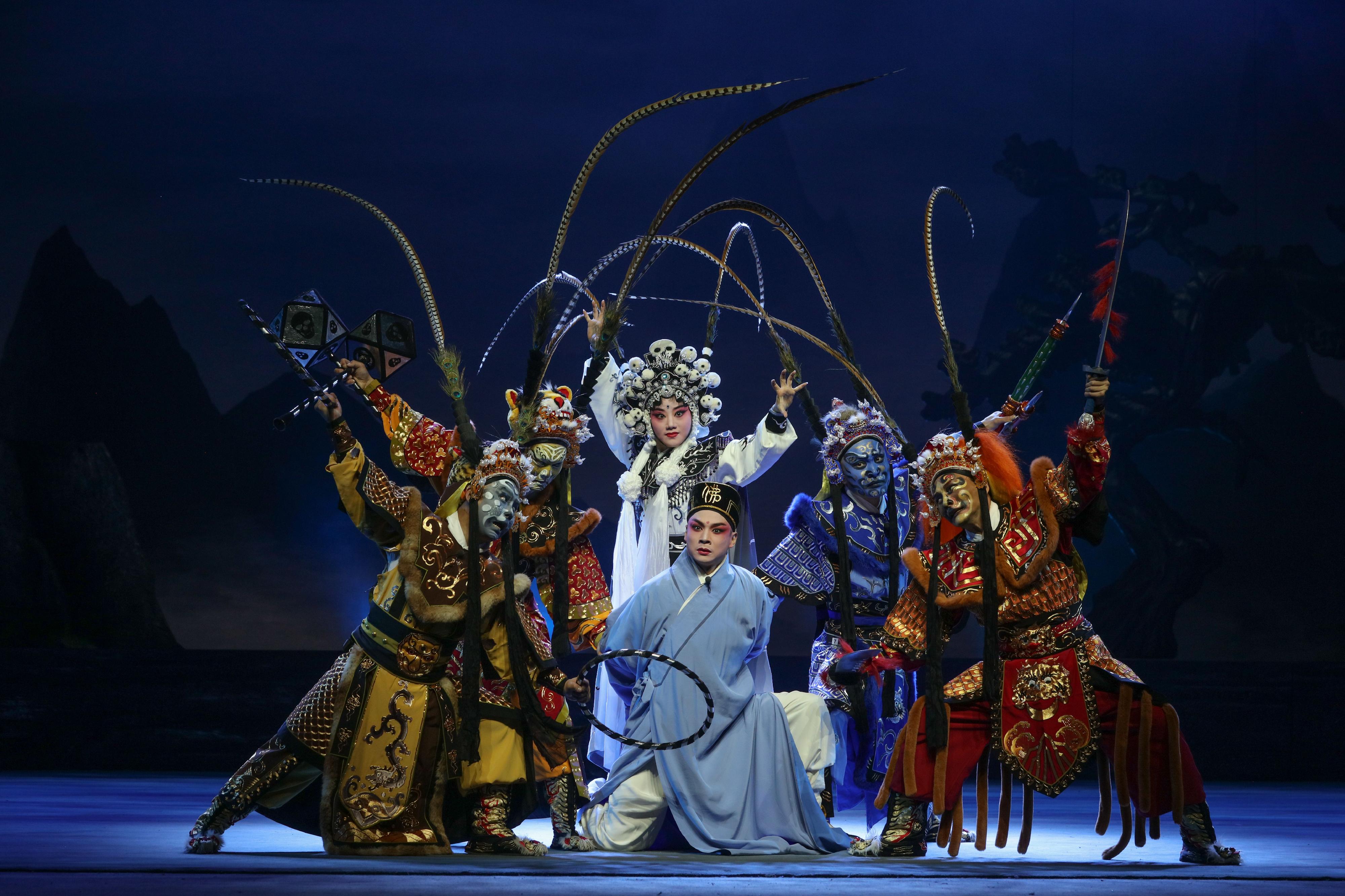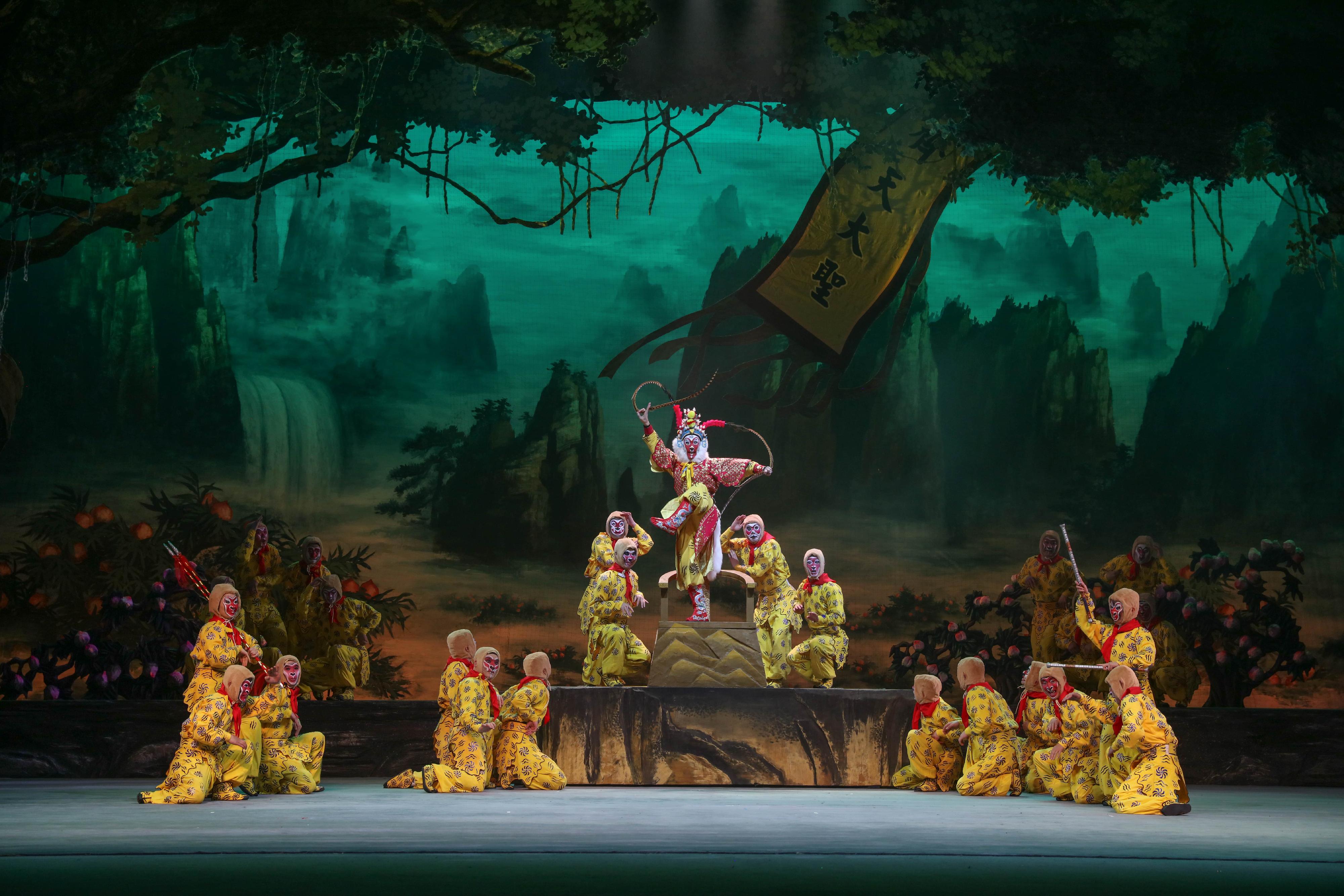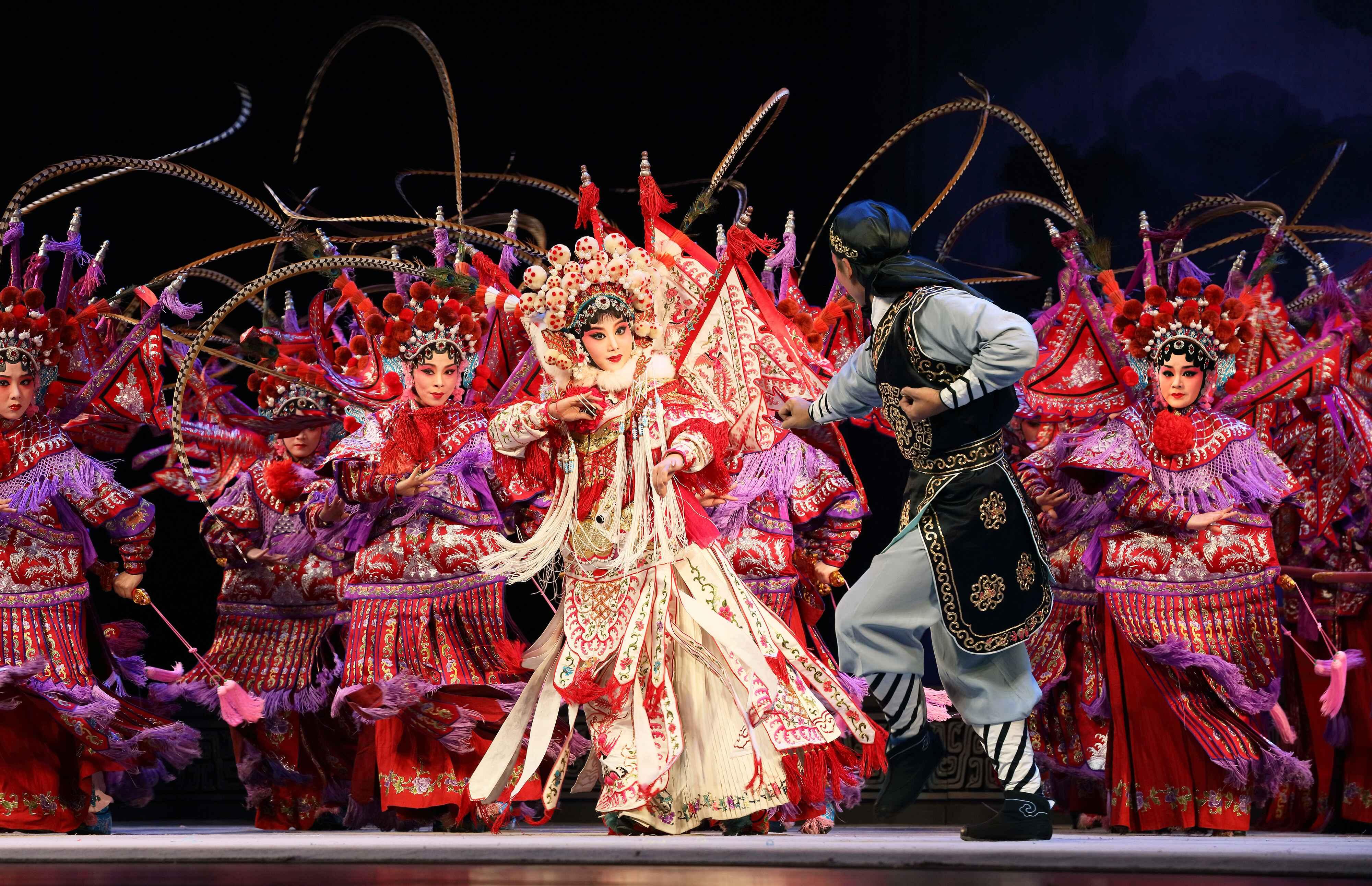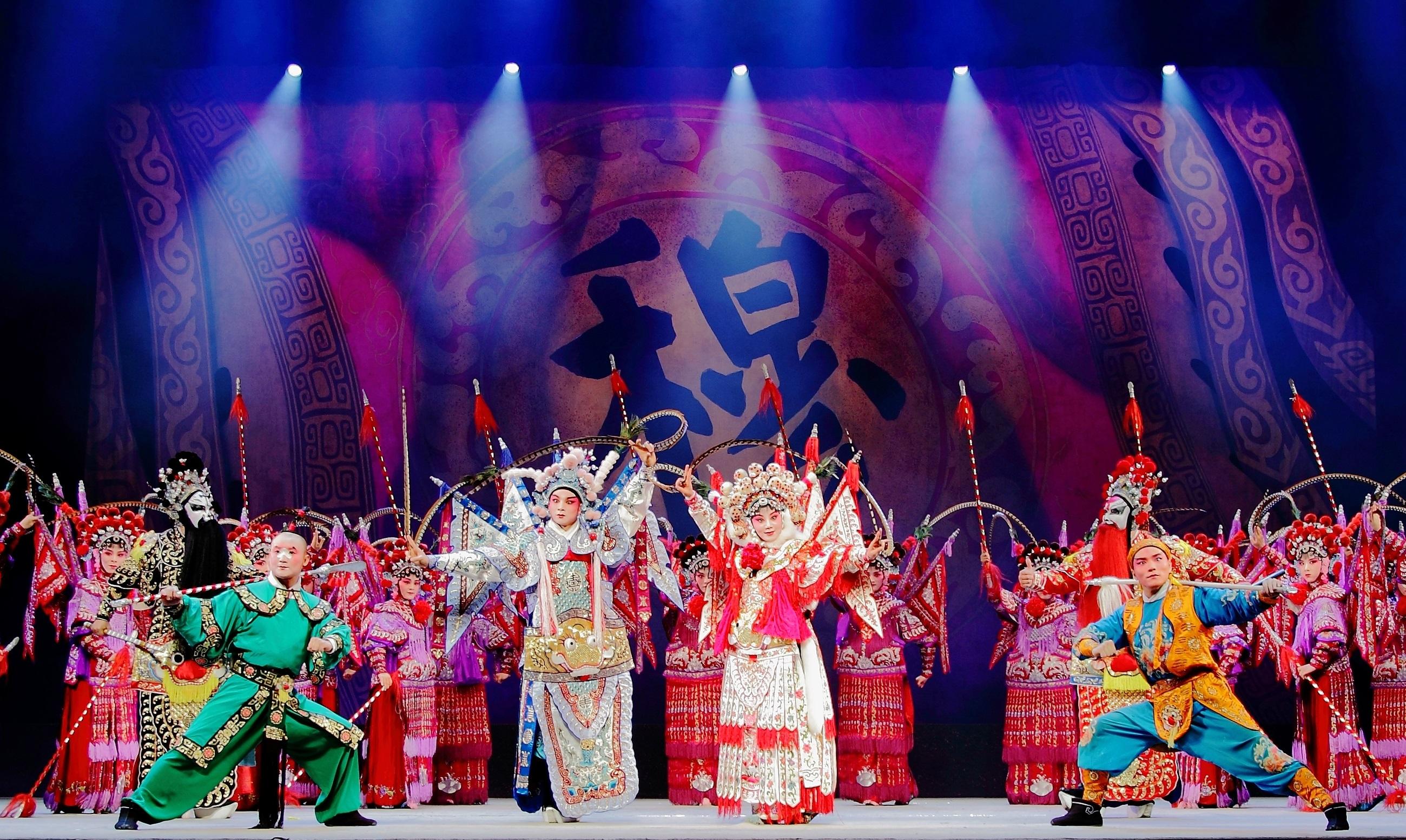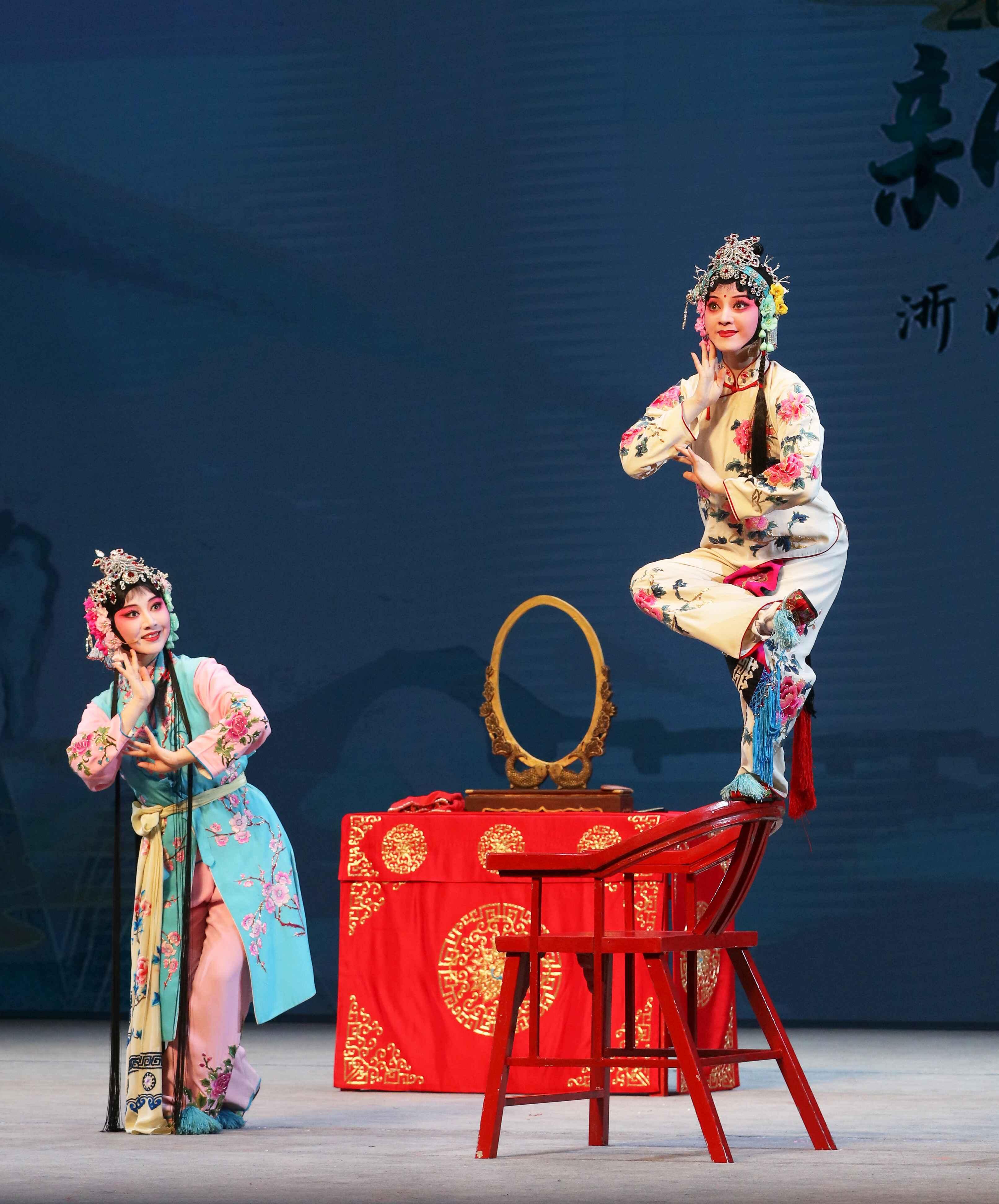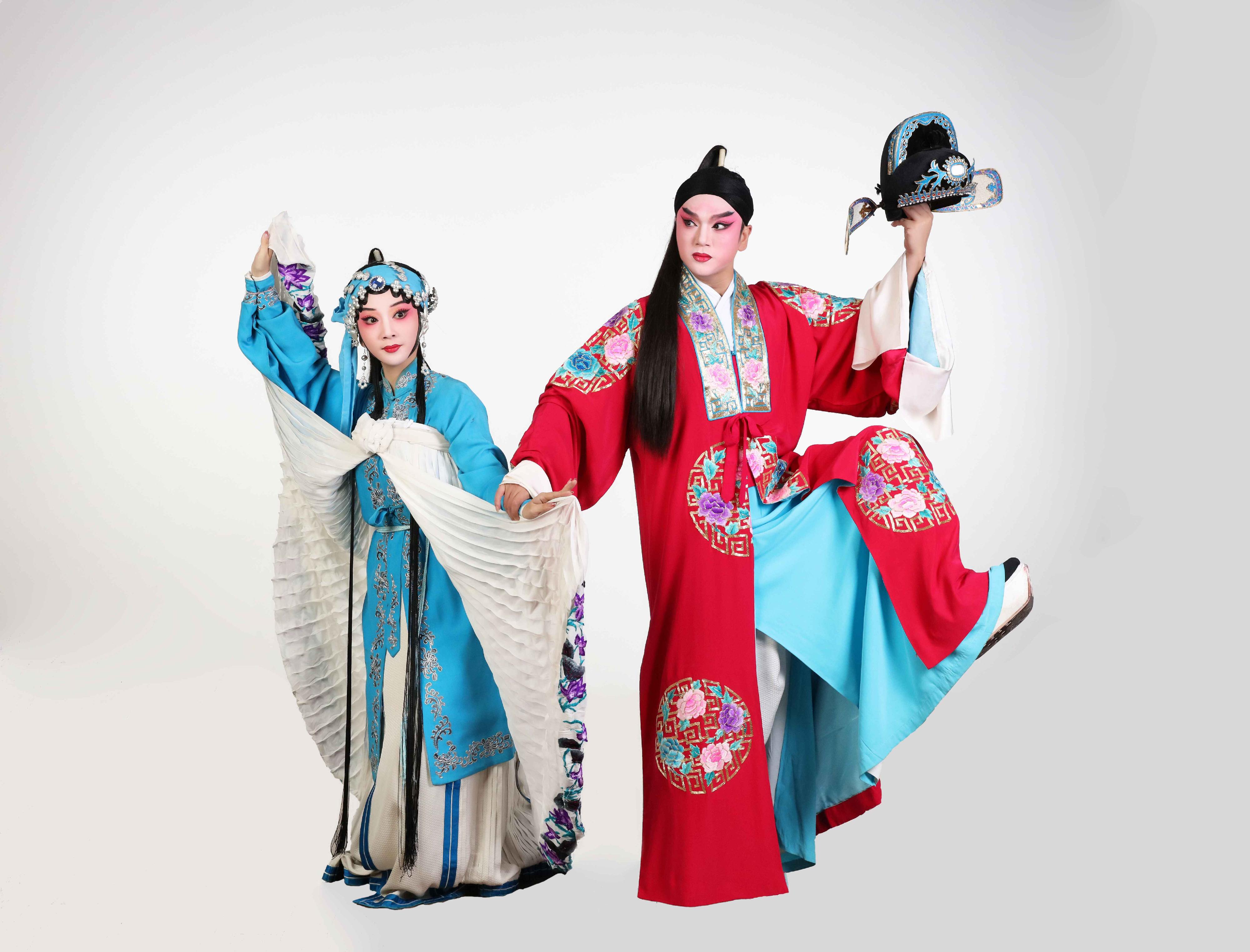Having received critical acclaim for its performances in Hong Kong last year, the Zhejiang Wu Opera Research Centre will return to the city and stage three stunning Wu opera performances in late July at the inaugural Chinese Culture Festival (CCF), organised by the Leisure and Cultural Services Department (LCSD). Winners of the China Theatre Plum Blossom Award Yang Xiayun and Lou Sheng will lead promising young artists to present a grand new production "Sun Wu Kong Thrice Beat the Bony Demon" for its Hong Kong debut. The classic repertoire "Mu Guiying" and a selection of excerpts will also be performed, offering audiences the experience of Wu opera with its blend of traditional and modern elements, as well as a harmonious balance of strength and tenderness. This programme is one of the highlights of the 12th Chinese Opera Festival.
Wu opera, also known as Jinhua opera, is the second major regional operatic genre of Zhejiang Province and is popular in Jinhua and its surrounding areas. It was named after Jinhua's former name, Wuzhou. The performance style of Wu opera is rugged and exaggerated, making it particularly effective in conveying an imposing atmosphere and intense emotions through exciting martial sequences and dance. Advocating the feature of "crossing the line between the martial and the civil repertories", Wu opera showcases the balance of boldness and tenderness, as well as a mix of strength and delicateness. The distinctive artistic charm of Wu opera has earned its inclusion on the list of Intangible Cultural Heritage at National Level.
"Sun Wu Kong Thrice Beat the Bony Demon", the latest hit of the troupe that is adapted from the classic story "Journey to the West", will be played at the first performance. Lou Sheng, who portrays Monk Tripitaka, will demonstrate an unconventional version of the role with martial movements, including somersaults and jumping, showcasing his excellence in both civil and martial roles. Yang Xiayun, on the other hand, will portray the charming and cunning Bony Demon, engaging in several fierce duels with the Monkey King performed by Zhou Hongwei, an outstanding post-90s artist of the troupe. Through astonishing techniques and stunts, the cast will display the iconic style of the Wu opera genre with a lively pace as well as a blazing and intense style.
The second performance will feature a selection of five operatic excerpts for different roles, presenting the traditional singing and martial arts sequences in Wu opera with its character of "crossing the line between the martial and the civil repertories" by the new generation of talented performers. "Killing Cai Yang" from "Sworn Brother's Reunion at the Old City", a bespoke part for actors in hongsheng (red-faced male) roles, displays a high level of acting skills including eye expressions and stylised bodily movements by the performers. "Hanging Up the Portrait" is an act for the xiaohuadan (young female) character, in which she expresses her excitement and nervousness before the arrival of her lover through stunts using a chair and handkerchief. "In the Prison Cell" from "Two Magical Gold Seals", a xiaosheng (young male) uses traditional Chinese operatic skills to depict movements such as falling into a well, paddling, climbing and pulling on a rope, vividly presenting the scenario of him being stuck in a water dungeon. In "A Bowl of Rice Noodles Outside the Window", audiences will witness the bravura singing between a xiaosheng and a guimendan (high-born lady). In the final excerpt, a wusheng (martial male) piece "Burning Zidu Alive", the main character Zidu will externalise his fear and terror through the use of Wu operatic "face-changing" tricks such as "wiping" and "blowing".
The final performance will be the full-length production "Mu Guiying" packed with youthful elements. Yang Xiayun will once again act as Mu Guiying in daomadan (female warrior) role, and develop a passionate romance with Yang Zongbao played by Lou Sheng. In the play, Yang Xiayun will show her versatility in acting, from portraying the tender and sweet girl in "The Encounter" to the heroine in "The Marriage" who pinpoints the weakness in the army formation while showing off her flowing-sleeves skills. "The Wedding Night" also offers a new artistic interpretation of the scene that breaks tradition. With a combination of spectacular stage design, extraordinary skills in acting and singing by the artists and a series of mass martial arts scenes, audiences will be offered a feast of Wu opera with all-rounded features.
Details of the three performances are as follows:
Date and time: July 26 (Friday), 7.30pm
————————————-
"Sun Wu Kong Thrice Beat the Bony Demon"
Main cast: Zhou Hongwei, Yang Xiayun, Lou Sheng, Dong Xuyang, Liu Fuming, Zhang Ying, Gao Qian, Sun Zishan
Synopsis: Monk Tripitaka and his disciples are on their pilgrimage to India to bring back the sacred scrolls to China. The adept, shapeshifting Skeleton Demon disguises itself three times to fulfil its desire to eat Tripitaka's flesh. Its antics are seen through by Wukong the Monkey King who "kills" its incarnated forms every time. But to Tripitaka, Wukong's acts are repeated manslaughter, and he angrily sends him away. Tripitaka and the other disciples then fall into the clutches of the demon. Putting his grudges aside, Wukong goes to save his master.
Date and time: July 27 (Saturday), 7.30pm
—————————————————————
Excerpt "Killing Cai Yang" from "Sworn Brothers' Reunion at the Old City"
Main cast: Li Xuanyu
Synopsis: The three sworn brothers, Liu Bei, Guan Yu and Zhang Fei, are separated after the Battle of Xuzhou. Guan Yu is trapped and temporarily stays in Cao Cao's camp. After learning of Liu Bei's whereabouts, Guan Yu heads straight for the old city where Zhang Fei resides. However, Zhang Fei suspects that Guan Yu has already surrendered to Cao Cao and refuses to open the city gates. Cao Cao's general Cai Yang, who is hunting down Guan Yu, arrives at the scene. The exhausted Guan Yu kills Cai Yang to prove his allegiance to Liu Bei. Zhang Fei welcomes Guan Yu into the city and offers his apologies.
Excerpt "Hanging Up the Portrait"
Main cast: Wu Qingfei
Synopsis: During a spring outing to the outskirts of the city, Yelu Hanyan runs into the handsome Hua Yun and falls in love. Hanyan falls ill with lovesickness, and receives help from Hua Yun's mother. They devise a plan for Hua Yun to disguise himself as a woman and visit Hanyan at her residence. Hanyan decorates her room and waits for Hua Yun to arrive.
Excerpt "In the Prison Cell" from "Two Magical Gold Seals"
Main cast: Lou Sheng, Chen Lili
Synopsis: Xu Qing, a young and newly appointed inspector, disguises himself to investigate a case in Wenzhou. He is recognised by Wang Chengming, the son of a high-ranking official, and thrown into a water dungeon. Xu is rescued by the commoner girl Ding Meihua and escapes from the water dungeon.
Excerpt "A Bowl of Rice Noodles Outside the Window"
Main cast: Chen Jianxu, Lou Yiting
Synopsis: Gao Wenju, a scholar from Luoyang, bids farewell to his wife Jin Zhen and travels to the capital for the imperial examination. They each keep half a pearl as a token of their love. After Gao is named the top scholar, he is forced by Prime Minister Wen Ge to marry his daughter. He sends a letter to ask Jin to come to the capital, but Lady Wen changes it to a letter of divorce. Jin goes to the capital to search for her husband, and is locked up in the rear courtyard of the Prime Minister's residence. Fortunately, with the help of the old maidservant Duniang, Jin manages to send Gao a bowl of rice noodles on the evening of the Mid-Autumn Festival. Gao is surprised by the familiar taste, and when he finds half a pearl inside the noodles, he realises that it must belong to Jin. The two meet up at night and sort out their misunderstandings.
Excerpt "Burning Zidu Alive"
Main cast: Sun Zishan
Synopsis: The states of Zheng and Xu are at war. Zidu, the grandson of the Duke of Zheng, kills his commander Ying Kaoshu with an arrow from the dark to take credit for their victory. After the army returns to the capital, Zidu becomes terrified and anxious. At the celebratory banquet, Zidu starts seeing and hearing things and nearly goes insane. In the end, he takes his own life.
Date and time: July 28 (Sunday), 7.30pm
—————————————–
"Mu Guiying"
Main cast: Yang Xiayun, Lou Sheng, Chen Jianxu, Li Xuanyu, Gao Qian, Chen Xiaojian, Wu Yanxing, Liu Fuming, Song Baoduan
Synopsis: During the Song dynasty, the Liao army invades the borders and sets up the Heavenly Gate Formation. Despite repeated attempts, Yang Yanzhao and his son Yang Zongbao are unable to defeat them. Zongbao goes to Mount Wutai to find someone who can break through the formation. When passing by the Muke Fortress, he is captured by Mu Guiying, the leader of the fortress, and brought into the fortress. Mu, who is well-versed in military formations and has a strong sense of patriotism, develops feelings for Zongbao. She points out the secret to breaking the formation to Zongbao and draws him a plan. The two agree to hold a wedding, and then have Mu lead the local militia to help break through the formation. Yang Yanzhao learns that his son has married without approval, and orders Zongbao to be tied up and executed at the entrance of the camp. Mu is shocked by the news and rushes to the commander's tent. In the end, she hands over the plans, and the couple join forces to break the formation.
Founded as the Zhejiang Wu Opera Theatre Company in 1956, the Zhejiang Wu Opera Research Centre has been reviving and exploring the traditional art of Wu opera. The troupe has nurtured a number of outstanding artists, including winners of the Plum Blossom Award. It has created and performed several distinguished plays. Many of them were awarded in the national Chinese opera showcase, and have been staged in numerous countries and regions across Europe and Asia.
The three performances will be held at the Auditorium of Sha Tin Town Hall. Lyrics and dialogue are with Chinese and English surtitles. Tickets priced at $180, $280, $380 and $480 are now available at URBTIX (www.urbtix.hk). For telephone bookings, please call 3166 1288. For programme enquiries and concessionary schemes, please call 2268 7325 or visit www.ccf.gov.hk/en/programme/zhejiang-wu-opera-research-centre/.
The programme will also feature two meet-the-artists sessions (in Putonghua), entitled "The Legacy and Development of the Art of Contemporary Wu Opera" to be held at 7.30pm on July 25 (Thursday) and "The Dissemination and Development of Zhejiang Wu Opera Research Centre" to be held at 2.30pm on July 27 (Saturday). Both sessions will be held at AC2, Level 4, Administration Building, Hong Kong Cultural Centre. The speakers include the troupe's performer Yang Xiayun and its deputy director Xie Linghui, while Chinese opera researcher Chan Chun-miu will be the moderator. Admission is free and online registration is required (www.lcsd.gov.hk/CE/CulturalService/Programme/en/chinese_opera/programs_1716.html#tab_13_0). Limited seats are available on a first-come, first-served basis.
The CCF, presented by the Culture, Sports and Tourism Bureau and organised by the LCSD's Chinese Culture Promotion Office, aims to enhance the public's appreciation of Chinese culture and cultivate citizens' national identity and cultural confidence. The inaugural CCF is held from June to September. Through different performing arts programmes in various forms and related extension activities, including selected programmes of the Chinese Opera Festival, exemplary local arts projects recognised by the China National Arts Fund, performing arts programmes from arts and cultural organisations, film screenings, exhibitions, talks and more, the festival allows members of the public and visitors to experience the broad and profound Chinese culture with a view to promoting Chinese culture and patriotic education as well as enhancing national identity among the people of Hong Kong, making contributions to the steadfast and successful implementation of "one country, two systems". For details, please visit the CCF website www.ccf.gov.hk.
The LCSD has long been promoting Chinese history and culture through organising an array of programmes and activities to enable the public to learn more about the broad and profound Chinese culture. For more information, please visit www.lcsd.gov.hk/en/ccpo/index.html.
Follow this news feed: East Asia






